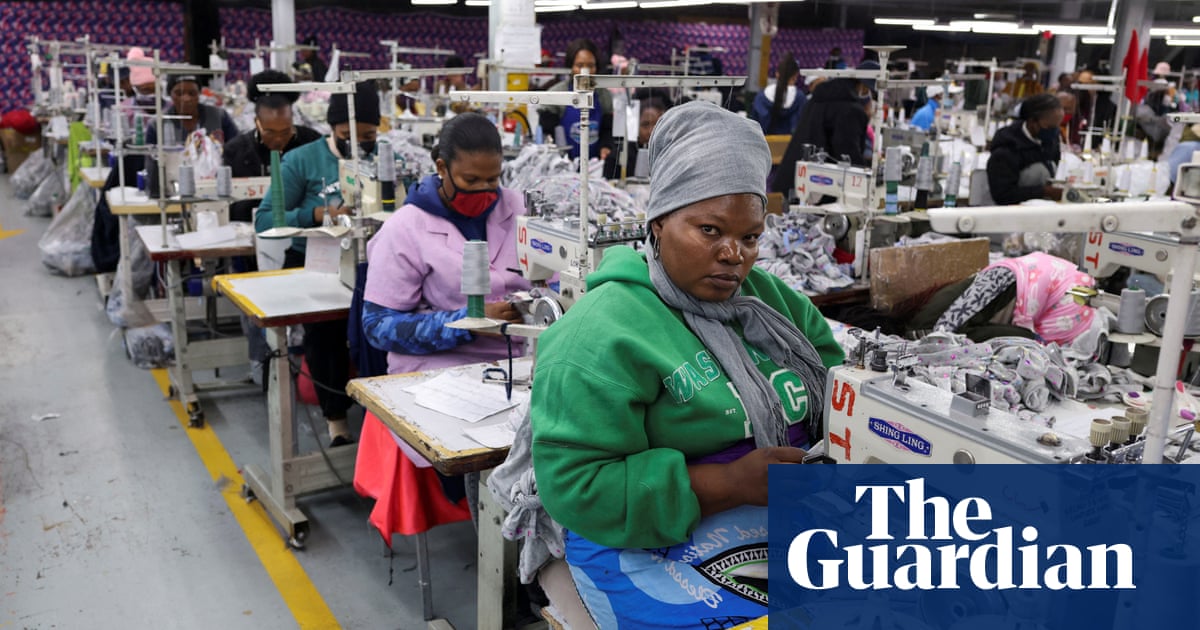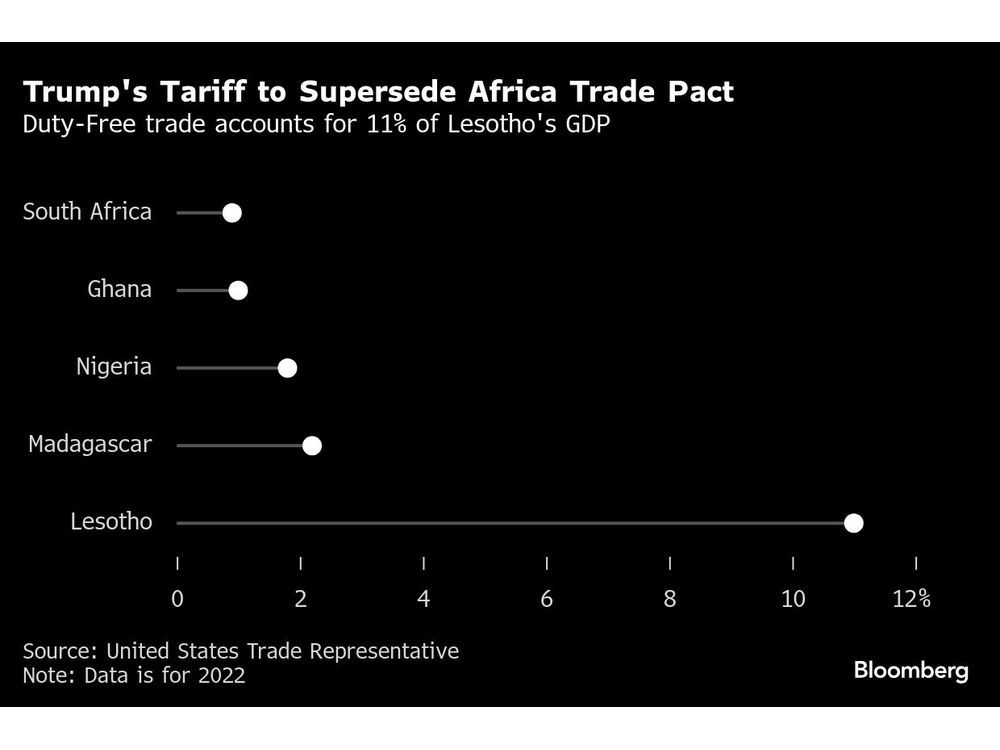- The Fashion Operator
- Posts
- 🌍 Lesotho without AGOA, London Men's cancelled by BFC
🌍 Lesotho without AGOA, London Men's cancelled by BFC
Your 10th of April 2025 African fashion news & careers update

Good morning Operators,
Before we begin, a request: only about 10% of you have taken the reader survey. If you haven’t, and this newsletter brings you any value at all, please take 3 minutes to do it — it helps SO much with choosing what to write about, what headlines to source, etc. I appreciate it! Now let’s talk news.
Table of Contents

Lesotho without AGOA
You know that small African country Trump has ‘never heard of’?
I grew up there.
I was 3 when we left Nigeria for Lesotho, settling in its capital Maseru for my dad’s job as a doctor in the main public hospital. We stayed 9 years before moving to South Africa.
I didn’t know it back then, but even with the water export project that boosted the economy and dominated the headlines, Lesotho already ran on fashion. When AGOA came along in 2000, investing in manufacturing (and inviting manufacturers to set up shop) made more and more economic sense for participating countries like Lesotho.
Efforts could have focused on any product category, but my bet is that it was fashion for one of the key the reasons I believe in it as a driver of economic change for Africa: It’s relatively easy to train people in sewing and other production skills from any background or education level.
Eventually, textiles & apparel became the biggest formal sector employer in the country with over 35,000 employees (it doesn’t sound like a lot, but Lesotho is only 2.3M people, and has major challenges with unemployment & poverty).
Along with other sectors, the growth in textiles & apparel was built on the back of AGOA, which allowed for better profit margins on exports to the US thanks to duty-free trade terms. The manufacturers (some local but many Chinese and Taiwanese as well) built businesses in Lesotho and benefitted from the deal, but so did their clients — companies like Levi's, Walmart, Reebok and even Ralph Lauren. Lesotho became the largest clothing exporter to the USA in Sub Saharan Africa, sending 80% of exports there under AGOA.
That’s what they stand to lose, because AGOA is over now. The new tariffs don’t change manufacturing costs, but they change landing costs: every charge tied to getting an order to its final destination, including tariffs, a type of custom duty charged at the importing country’s border.
Contracts vary but in one way or another, the landing cost ends up with the client, who either pays it as part of their factory invoice, or directly to customs when they collect their delivery from a port. Imagine waking up one day to collect an order in the US that suddenly costs an extra 50% of the customs value of the clothes. [Customs value = the price of the order ± any adjustments made according to customs rules.]

Most garment worker jobs in Lesotho are paid the monthly minimum wage of $146-$163 and are nevertheless highly sought after. Photograph: Roberta Ciuccio/AFP/Getty | The Guardian
We already know some of what comes next: Ethiopia was suspended from AGOA in January 2022, so it’s a vision of the future for AGOA-dependent economies that invested heavily in textile and apparel manufacturing (90% of exports were fashion related). 11500 jobs were lost, and most belonged to young women.
Mauritius, another AGOA beneficiary and major fashion manufacturer, has more economic diversification than Lesotho, so they might do better with their slightly lower tariff (40%) and other industries to fall back on, but textiles & apparel is a huge industry for them too, and they’ll see similar losses.
On one hand, these are quite simply the consequences of being too reliant on any one sector or market. You are completely vulnerable to any change that affects a whole country like the US or a whole industry like fashion.
On the other, America seems to have forgotten why they make deals like AGOA in the first place: to boost their economy by using these preferential rates to support the buying power and profit margins of American companies.
American fashion brands that work with Lesotho have 3 options right now: Stay and eat the new cost in their profit margin (why?), stay and pass the cost onto consumers by raising prices (risky), or leave and find new partners in a country they can afford to do business with (probably — they’re already pausing and cancelling Chinese orders).
Where should they go? Where should we go? It’s important to remember these rates only affect the reality of doing business with the USA, even if they are world’s biggest economy (likely to be unseated by China soon); the tariffs have nothing to do with all the business other countries do with each other that doesn’t involve the USA. Lesotho and others will need new demand from new markets and with so much upheaval, they may find it.
So maybe we manufacture at home and sell to Chinese consumers, like we discussed last week. Or we go to neighbours on the continent if AfCFTA goes as hoped, at least partially replacing each other’s US manufacturing orders. Maybe Europe; they do so much of their own manufacturing that they hardly need it but it would be interesting if we could compete on price. Countries like Eswatini, Kenya and now Ethiopia that deal in textiles & apparel but only got hit with the minimum 10% may just keep it moving, finding themselves in a more favourable position as others’ costs rise a lot more.

Across Africa

Career Opportunities
Role | Company | City |
|---|---|---|
Spitz Group | Johannesburg | |
Bishyaka | Cairo | |
KOIKOI Clothing | Cape Town | |
Truworths | Cape Town | |
Refinery | Bellville | |
Recruiter | Lagos | |
Truworths | Cape Town | |
Recruiter | Midrand/Johannesburg | |
Jonsson Workwear | Hlotse, Lesotho | |
M.O.T. the Label | Lagos | |
The Foschini Group | Parow/Cape Town | |
Recruiter | Lagos | |
The Foschini Group | Parow/Cape Town | |
Sneaker Lab | Cape Town | |
Recruiter | Johannesburg |

Elsewhere
That’s all for today — thoughts?
With thanks,
Modupe
 | Writer | Speaker | Consultant Fashion & creative industries in Africa |
What did you think of today's edition?Be honest... |












Reply